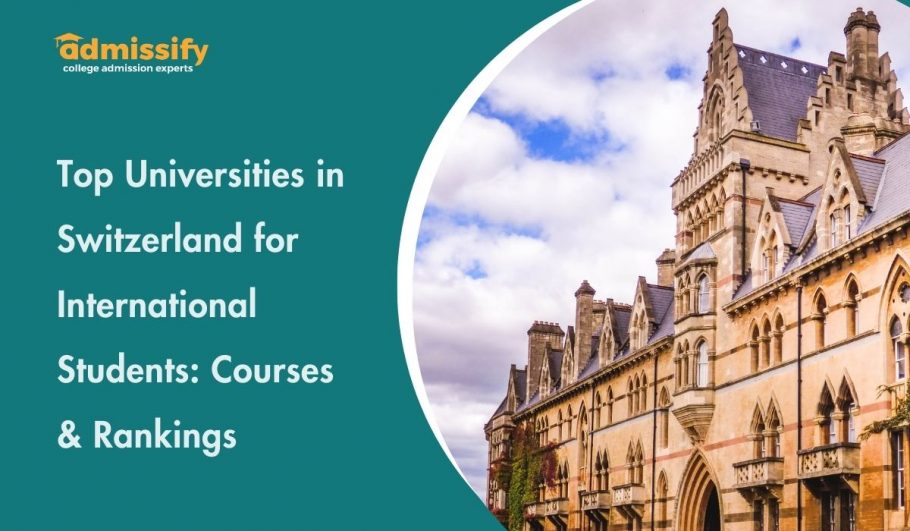Last Updated on August 29, 2024
Imagine a study abroad destination that is an amalgamation of breathtaking views, fantastic academic opportunities, and home to some of the best professional opportunities in the world. That is Switzerland for you- a premier destination for international students seeking unparalleled prospects. With its relentless dedication to research and student-centric approach, Swiss universities offer a transformative educational experience across bachelor’s, master’s, and doctoral programs.
But what truly sets Switzerland apart is the growing wave of international students flocking to its shores. Government forecasts paint a compelling picture – by 2031, the student population is expected to swell to around 320,000, a remarkable 15% increase from 2021. This surge underscores Switzerland’s allure as a prime destination for global learners. In this blog post, we shall explore the top universities in Switzerland, fantastic scholarship opportunities, the admission process, and more.
Key Highlights
As the numbers speak for themselves, the Swiss Embassy in India has been real busy, processing a staggering 129,446 visa applications from January to June 2023 alone. This unprecedented demand highlights the growing interest and aspirations of Indian students. Let’s unravel the major key factors that define education in Switzerland here:
| Particulars | Details |
| Top Universities in Switzerland | University of Zurich, University of Basel, ETH Zurich, École Polytechnique Fédérale de Lausanne University of Bern |
| Average Tuition Fee | INR 4L to INR 12L |
| Average Cost of Living (without rent) | INR 1.5L |
| Average Rent in City | INR 1.6L |
| Average Transportation Cost Monthly Pass | INR 7300 |
| Average Utilities Cost | INR 21,000 |
| Scholarships | The Excellence Scholarship by ETH ZurichMaster’s Grants in SwitzerlandNestle MBA Scholarships for Women from Developing CountriesSwiss Government Excellence Scholarships |
Top Universities in Switzerland
The number of students who have registered at Swiss higher education institutions (UIT, UAS, or UTE) increased by 18% over the past ten years. This growth has resulted in a total enrollment of around 276,500 students for the academic year 2023/24.
Now let’s take a look at the top, best Swiss universities, depicting their average tuition fees for UG and PG courses:
| University | QS World University Rankings 2024: Top Global Universities | Times Higher Education (THE) World University Rankings 2023 |
| ETH Zurich, Zurich | #7 | =11 |
| EPFL, Lausanne | #36 | #41 |
| University of Zurich, Zurich | =91 | =82 |
| University of Basel, Basel | =124 | =101 |
| University of Bern, Bern | =126 | #94 |
| University of Geneva, Geneva | #128 | #201-250 |
| University of Lausanne, Lausanne | =220 | #135 |
| USI – Universita della Svizzera italiana, Lugano | =328 | #201-250 |
| University of St. Gallen (HSG), St. Gallen | =436 | – |
| Universite de Fribourg, Fribourg | =563 | #501-600 |
Popular Programmes at Switzerland Universities
Swiss universities have an extensive array of programs, with several of their courses receiving high rankings on international ranking systems. A list of Switzerland’s best universities along with some of the well-liked courses they offer is provided below.
Here is the information rearranged and tabulated:
| University | Programs |
| ETH Zurich, Zurich | Architecture & Built Environment, Electrical & Electronic Engineering, Chemical Engineering, Civil & Structural Engineering, Biological Sciences, Computer Science & Information Systems, Earth & Marine Sciences, Geology, Geophysics, Mathematics |
| EPFL, Lausanne | Chemistry & Chemical Engineering, Physics, Mathematics, Computer Science, Microengineering, Life Sciences Engineering, Architecture, Robotics, Data Science, Cyber Security, Applied Physics, Digital Humanities, Financial Engineering |
| University of Zurich, Zurich | Ethnology, Political Science, Popular Cultures, Sociology, Banking & Finance, Informatics with Natural Sciences, English Literature & Linguistics, Film Studies, Indology, Physics, Geography, Psychology, Theology |
| University of Basel, Basel | Biology, Classical Studies, Chemistry, Computational Sciences, Ethnology, English, Geography, French Studies, Earth Sciences, Medical Studies, Cultural Anthropology, Animal Biology, Biomedical Engineering, Business & Technology, Data Science, Drug Sciences |
| University of Bern, Bern | Dental Medicine, Economics, Biology, Art History, Earth Sciences, Climate Sciences, Geography, Interreligious Studies, Law, Middle Eastern Studies, Linguistics, Musicology, Physics, Social Sciences, Sport Science, Theology |
| University of Geneva, Geneva | Computer Science, Mathematics, Chemistry, Physics, Biochemistry, Earth & Environmental Sciences, Prehistoric Archeology, Dental Medicine, Biomedical Sciences, Sociology, Geography & Environment, Political Sciences, Economics & Management, Neuroscience |
| University of Lausanne, Lausanne | Biology, Pharmaceutical Sciences, Law, Forensic Sciences, Geosciences & Environment, Management, Economics, Political Science, Psychology, Human Movement & sports sciences, Study of Religions, Theology, Molecular Life Sciences, Tourism Studies, Digital Humanities |
| USI – Universita della Svizzera italiana, Lugano | Architecture, Philosophy, Theology, Medicine, Communication, Computer Sciences, Economic Sciences, Political Economy, Finance, Tourism, IT |
| University of St. Gallen (HSG), St. Gallen | Law & Economics, International Affairs, Business Administration, Computer Science, Accounting & Corporate Finance, Marketing Management, Quantitative Economics & Finance |
| Universite de Fribourg, Fribourg | Theology, Law, Management, Economics, Business Communication, Philosophy, English Language & Literature, Greek Studies, French, Contemporary History, Politics & Society, Religious Studies, Psychology, Biochemistry, Mathematics, Earth Sciences, Human Medicine, Biomedical Sciences, Computer Science, Business Informatics, Education Sciences |
Cost of Attendance, Pre-Arrival Cost, and Living Cost in Switzerland
Living Expense:
Students, get ready to explore the cosmopolitan hubs of Geneva, Bern, and Zurich, where top-tier institutions wait for you to realise your educational goals. Students must prepare to invest an average of CHF 18,500 (approximately $20,000) annually for bachelor’s and postgraduate diploma pursuits. For MBA aspirants, the stakes are higher, with tuition fees soaring to CHF 25,000 and beyond (around $27,000 or more).
Yet, within this financial maze lies an advanced academic model that bases itself on academic integrity, research, and pragmatic learning. Switzerland’s prestigious, high-ranking universities provide an excellent ROI, with the country fostering fantastic professional opportunities.
With strategic planning and unwavering determination, you can beat the cost of living in Switzerland. Let’s explore the cost of living in Switzerland with the help of the following data:
| List | Amount per month |
| Accommodation | CHF 450 to CHF 1,750 |
| Health insurance | CHF 350 |
| Household items | CHF 40 |
| Phone/internet/TV | CHF 120 |
| Electricity/gas | CHF 40 |
| Public Transport | CHF 150 |
| Food | CHF 400 |
| Clothes, shoes, and leisure activities | CHF 200 |
| Miscellaneous (medical treatments, gifts, and more) | CHF 180 |
Scholarship Programs at Top Universities in Switzerland
International students can apply for scholarships from a number of Switzerland’s best colleges. These are listed in the following order:
| Name of the Scholarship | Duration | Eligibility | Award Size |
| EPFL Excellence and Fellowships | The award is for 4 semesters | Anyone applying for a Master’s degree is eligible. | CHF 10,000 /semester, Also, one room at the student residency at the campus |
| Geneva Academy of International Humanitarian Law and Human Rights Scholarships | 10 Months | Students applying for Law (Bachelor’s and Master’s), with good merit scores, excellent extracurricular activities, and the need for finance | Covers tuition fees and living expenses |
| Nestle Scholarship for Women | One time | Women from developing countries, applying for Masters of Business Administration (MBA). Nestle employees are not eligible. | CHF 25000 |
| Master of Excellence scholarships offered by the University of Geneva | One year is extended further based on the performance | Prepare for the English Proficiency Test. | CHF 10,000 to CHF 15,000/year |
| Internship at CERN Switzerland’s program | One time | Eligible for those who haven’t appeared for IELTS or TOEFL tests. | Prepare for the English Proficiency Test. |
Student Visa Process
Students from non-EU/ETA countries must have visas and residence permits. You can apply for a visa at the consulate, and after arriving in Switzerland, you need to get a residence permit. Students may come for short stays or long stays, based on their degree. Therefore, there are two kinds of visas:
- Visas for short stays – it will need 10 to 15 days for arrival and this type of visa is given for 90 days.
- Long-stay visas, such as those for pursuing a full-time degree, usually require around 8 to 10 weeks.
Program Specific Work Permit
Students may remain and work for up to six months after earning their degree, putting in fifteen hours a week. However, after the student secures long-term employment, they are granted a work permit.
Conclusion
From the prestigious ETH Zurich to the renowned University of Geneva, these esteemed institutions beckon with a diverse array of programs, ranging from technology and engineering to the depths of humanities and social sciences.
Your journey, however, need not be a solitary one. Admissify, your trusted EdTech companion, stands ready to guide you through every step of your study abroad goals. Our comprehensive services encompass profile building, ensuring your unique strengths shine, and securing coveted internship opportunities that push your professional ambitions in the long run.

My primary goal is to provide a supportive and empowering environment where students can explore their thoughts, feelings, and concerns. I strive to help students develop self-awareness, resilience, and coping strategies to navigate the challenges of academic life, personal growth, and transitions. I aim to foster a sense of belonging and community, ensuring that students feel heard, valued, and understood. I utilize a variety of therapeutic techniques and approaches to meet students’ individual needs, empowering them to make positive changes, enhance their well-being, and achieve their personal and academic goals.




